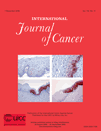Wnt signaling promoter hypermethylation distinguishes lung primary adenocarcinomas from colorectal metastasis to the lung
Abstract
Promoter hypermethylation is responsible for gene inactivation during carcinogenesis. It has been proposed that there is some degree of specificity in the set of genes that become altered by this mechanism in distinct tumor types. To understand whether promoter hypermethylation may differentiate the site of origin, 49 lung adenocarcinomas from 31 lung primaries and 18 metastases from colorectal primaries, respectively, were tested for the presence of this alteration in the APC, CDH1, DAPK, GSTP1, MLH1, MGMT, P14, P16, RARβ2, RASSF1, sFRP1 and WIF-1 genes. A distinct profile was apparent for the 2 groups of lung tumors and the frequencies of promoter hypermethylation at sFRP1 and WIF-1, 2 genes involved in Wnt signaling, and at CDH1 were significantly higher in colorectal metastases than in lung primaries, whereas methylation of the APC promoter was significantly more common in lung primary adenocarcinomas. Some tumors showed concomitant APC, sFRP1 and WIF-1 gene inactivation, indicating that multiple DNA methylation events must have occurred to definitively down-regulate the signaling through Wnt. However, promoter hypermethylation at the APC and CDH1 genes tended to be mutually exclusive (Fisher's exact test, p = 0.006), suggesting a similar role in carcinogenesis. In conclusion, we propose that inactivation by promoter hypermethylation at the APC, CDH1, sFRP1 and WIF-1 genes may contribute to the discrimination of lung primary adenocarcinomas from colorectal metastasis to the lung, and report the simultaneous presence of methylation at the promoters of multiple genes involved in the Wnt signaling. This may have biological consequences for carcinogenesis. © 2006 Wiley-Liss, Inc.




